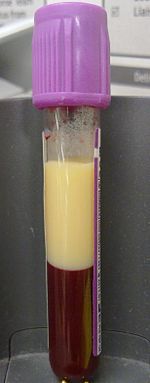
Back فرط شحميات الدم Arabic Hiperlipidemiya Azerbaijani Hiperlipèmia Catalan Hyperlipoproteinämie German Hiperlipidosis Spanish Hiperlipidemia Basque هیپرلیپیدمی Persian Hyperlipémie French היפרליפידמיה HE हाइपरलिपिडिमिया Hindi
| Hyperlipidemia | |
|---|---|
| Other names | Hyperlipoproteinemia, hyperlipidaemia[1] |
 | |
| A 4-ml sample of hyperlipidemic blood in a vacutainer with EDTA. Left to settle for four hours without centrifugation, the lipids separated into the top fraction. | |
| Specialty | Cardiology |
| Differential diagnosis | Hypertriglyceridemia |
Hyperlipidemia is abnormally high levels of any or all lipids (e.g. fats, triglycerides, cholesterol, phospholipids) or lipoproteins in the blood.[2] The term hyperlipidemia refers to the laboratory finding itself and is also used as an umbrella term covering any of various acquired or genetic disorders that result in that finding.[3] Hyperlipidemia represents a subset of dyslipidemia and a superset of hypercholesterolemia. Hyperlipidemia is usually chronic and requires ongoing medication to control blood lipid levels.[3]
Lipids (water-insoluble molecules) are transported in a protein capsule.[4] The size of that capsule, or lipoprotein, determines its density.[4] The lipoprotein density and type of apolipoproteins it contains determines the fate of the particle and its influence on metabolism.
Hyperlipidemias are divided into primary and secondary subtypes. Primary hyperlipidemia is usually due to genetic causes (such as a mutation in a receptor protein), while secondary hyperlipidemia arises due to other underlying causes such as diabetes. Lipid and lipoprotein abnormalities are common in the general population and are regarded as modifiable risk factors for cardiovascular disease due to their influence on atherosclerosis.[5] In addition, some forms may predispose to acute pancreatitis.
- ^ Youngson RM (2005). "Hyperlipidaemia". Collins Dictionary of Medicine.
- ^ "Hyperlipidemia". The Free Dictionary. citing: Dorland's Medical Dictionary for Health Consumers. Saunders. 2007. and The American Heritage Medical Dictionary. Houghton Mifflin Company. 2007. ISBN 978-0618824359.
- ^ a b "Hyperlipidemia | Society for Vascular Surgery". vascular.org. Retrieved 2020-04-30.
- ^ a b Hall JE (2016). Guyton and Hall textbook of medical physiology. Elsevier. ISBN 978-1455770052. OCLC 932195756.
- ^ Lilly L (2015). Pathophysiology of heart disease : a collaborative project of medical students and faculty. Wolters Kluwer. ISBN 978-1496308696. OCLC 1052840871.
© MMXXIII Rich X Search. We shall prevail. All rights reserved. Rich X Search